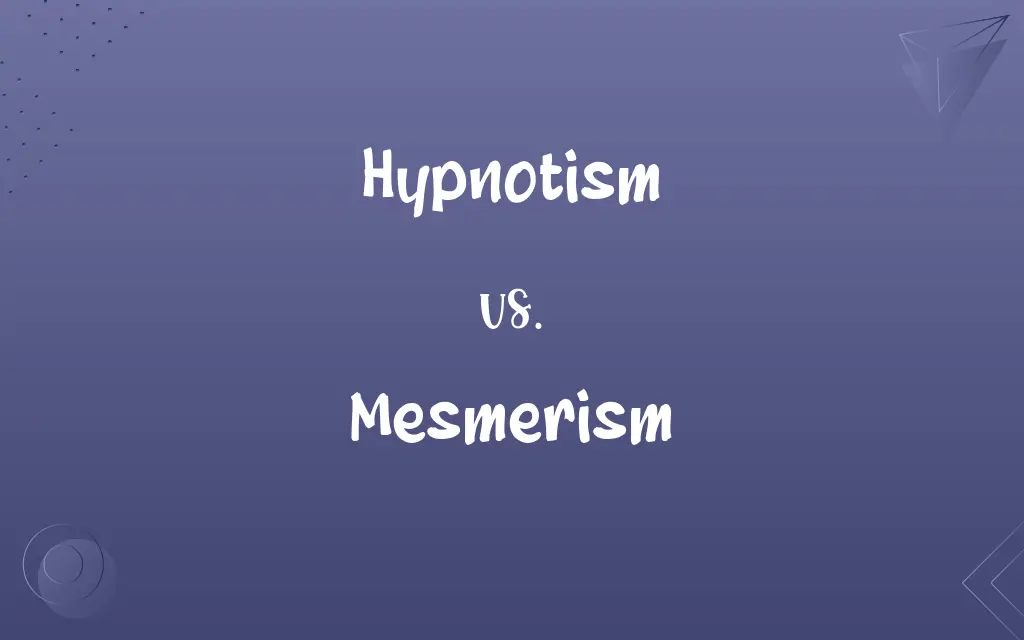Hypnotism vs. Mesmerism: Know the Difference

By Shumaila Saeed || Updated on December 25, 2023
Hypnotism is a psychological technique inducing a trance-like state for therapy, while Mesmerism is an outdated practice believed to manipulate a universal fluid for healing.

Key Differences
Hypnotism is a scientifically recognized technique used in therapy and medicine to induce a focused, trance-like state, enhancing suggestibility and relaxation. Mesmerism, an older concept, was based on the belief in an invisible natural force or fluid that could be manipulated by the practitioner for healing.
Shumaila Saeed
Nov 16, 2023
The practice of hypnotism involves guided relaxation and intense concentration to achieve a heightened state of awareness, often used in psychotherapy. Mesmerism, named after Franz Mesmer, proposed that this "animal magnetism" could cure various ailments and was not focused on the psychological aspects.
Shumaila Saeed
Nov 16, 2023
Hypnotism is often used to modify behavior, alleviate psychological distress, and enhance mental well-being. In contrast, Mesmerism was primarily used for physical healing and was often seen as a form of entertainment in the 18th and 19th centuries.
Shumaila Saeed
Nov 16, 2023
While hypnotism is grounded in psychological principles and is a part of modern therapeutic techniques, Mesmerism, with its lack of scientific backing, gradually became discredited and is considered pseudoscience.
Shumaila Saeed
Nov 16, 2023
Hypnotism's effectiveness is recognized in various fields, including psychology and pain management. Mesmerism, on the other hand, is historically significant but lacks empirical support in contemporary science.
Shumaila Saeed
Nov 16, 2023
ADVERTISEMENT
Comparison Chart
Techniques
Guided relaxation, concentration
Manipulation of "animal magnetism"
Shumaila Saeed
Nov 16, 2023
Contemporary Relevance
Widely used in therapy
Largely historical and discredited
Shumaila Saeed
Nov 16, 2023
ADVERTISEMENT
Hypnotism and Mesmerism Definitions
Hypnotism
A practice used in psychotherapy to modify behavior and attitudes.
Hypnotism has been effective in treating certain phobias.
Shumaila Saeed
Nov 16, 2023
Mesmerism
An 18th-century practice believed to heal through a universal fluid.
Mesmerism was once popular for its supposed healing powers.
Shumaila Saeed
Nov 16, 2023
Hypnotism
A technique inducing a trance-like state for therapeutic purposes.
Hypnotism helped him overcome his fear of flying.
Shumaila Saeed
Nov 16, 2023
Mesmerism
A technique involving the manipulation of "animal magnetism."
Franz Mesmer claimed to cure illnesses through mesmerism.
Shumaila Saeed
Nov 16, 2023
Hypnotism
A psychological method to enhance suggestibility and relaxation.
Through hypnotism, she was able to recall forgotten memories.
Shumaila Saeed
Nov 16, 2023
ADVERTISEMENT
Mesmerism
An outdated therapeutic practice focusing on magnetic forces.
Mesmerism was discredited with the advent of scientific medicine.
Shumaila Saeed
Nov 16, 2023
Hypnotism
A therapeutic tool for accessing the subconscious mind.
Hypnotism can be used to explore underlying psychological issues.
Shumaila Saeed
Nov 16, 2023
Mesmerism
A historical approach to healing, now considered pseudoscience.
Mesmerism's methods lacked empirical evidence and scientific basis.
Shumaila Saeed
Nov 16, 2023
Hypnotism
A state of focused attention and heightened awareness.
During hypnotism, patients often feel deeply relaxed yet aware.
Shumaila Saeed
Nov 16, 2023
Mesmerism
A form of treatment based on hypnotic induction and suggestion.
Mesmerism was a precursor to modern hypnotic practices.
Shumaila Saeed
Nov 16, 2023
Hypnotism
A form of sleep or trance, in some respects resembling somnambulism, but brought on by artificial means, in which there is an unusual suspension of some powers, and an unusual activity of others, especially a heightened susceptibility to suggestion. It is induced by an action upon the nerves, through the medium of the senses, by causing the subject to gaze steadily at a very bright object held before the eyes, or on an oscillating object, or by pressure upon certain points of the surface of the body, usually accompanied by the speaking of the hypnotist in quiet soothing tones. Called also hypnosis.
Shumaila Saeed
Oct 19, 2023
Mesmerism
The method or power of gaining control over someone's personality or actions, as in hypnosis or suggestion.
Shumaila Saeed
Oct 19, 2023
Hypnotism
The science which deals with the induction and properties of the hypnotic state.
Shumaila Saeed
Oct 19, 2023
Mesmerism
The state induced by hypnotic methods (especially that of Mesmer himself).
Shumaila Saeed
Oct 19, 2023
Mesmerism
An earlier name for hypnosis or hypnotism, the art of inducing an extraordinary or abnormal state of the nervous system, in which the actor claims to control the actions, and communicate directly with the mind, of the recipient. It is believed to be a state between sleep and wakefulness, in which a person is more susceptible to suggestion than when awake. See Animal magnetism, under Magnetism.
Shumaila Saeed
Oct 19, 2023
Repeatedly Asked Queries
What is Hypnotism?
Hypnotism is a psychological practice involving guided relaxation, intense concentration, and focused attention to achieve a heightened state of awareness or trance.
Shumaila Saeed
Nov 16, 2023
How does Hypnotism work?
Hypnotism works by guiding a person into a deeply relaxed and suggestible state, where they are more open to suggestions and can access deeper subconscious thoughts.
Shumaila Saeed
Nov 16, 2023
Is Mesmerism the same as modern Hypnotism?
No, Mesmerism is considered a precursor to modern hypnotism but with different theoretical foundations; Mesmerism was based on the idea of animal magnetism, which is not recognized in contemporary hypnotism.
Shumaila Saeed
Nov 16, 2023
Can Hypnotism be used for therapeutic purposes?
Yes, hypnotism is used in hypnotherapy to treat a variety of psychological and physical conditions, such as phobias, anxiety, sleep disorders, and pain management.
Shumaila Saeed
Nov 16, 2023
What is Mesmerism?
Mesmerism, named after Franz Mesmer, was an early form of what we now know as hypnosis, based on the belief in a natural energetic transference between animate and inanimate objects.
Shumaila Saeed
Nov 16, 2023
What was the main belief behind Mesmerism?
The main belief behind Mesmerism was that a mysterious energy or fluid, called animal magnetism, could be manipulated to cure illness and affect human behavior.
Shumaila Saeed
Nov 16, 2023
What are common uses of Hypnotism today?
Today, hypnotism is commonly used for stress reduction, pain management, behavior change, and enhancement of well-being.
Shumaila Saeed
Nov 16, 2023
Who can practice Hypnotism?
Hypnotism is generally practiced by trained and often certified professionals, such as psychologists, psychiatrists, and therapists, especially when used for therapeutic purposes.
Shumaila Saeed
Nov 16, 2023
Is Hypnotism safe?
Hypnotism is generally considered safe when conducted by a qualified professional; however, it may not be suitable for individuals with certain mental health conditions.
Shumaila Saeed
Nov 16, 2023
Was Mesmerism widely accepted in its time?
Mesmerism gained popularity in the late 18th century, but it was also met with skepticism and controversy among the scientific community.
Shumaila Saeed
Nov 16, 2023
How did Mesmerism fall out of favor?
Mesmerism fell out of favor due to a lack of empirical evidence and the rise of more scientifically grounded psychological practices.
Shumaila Saeed
Nov 16, 2023
Can Hypnotism alter memories?
Hypnotism can affect how individuals recall or perceive memories, but it is not a reliable method for accurately altering or retrieving memories.
Shumaila Saeed
Nov 16, 2023
Was Mesmerism scientifically proven?
Mesmerism, as originally practiced by Franz Mesmer, was not scientifically proven and is regarded as pseudoscience. Its principles of animal magnetism lacked empirical support.
Shumaila Saeed
Nov 16, 2023
Can anyone be hypnotized?
Most people can be hypnotized to some degree; however, the depth of hypnosis and responsiveness to suggestions can vary greatly among individuals.
Shumaila Saeed
Nov 16, 2023
Is Hypnotism considered a science?
Hypnotism is considered a legitimate psychological technique with scientific backing, especially in the context of therapy and medical treatment.
Shumaila Saeed
Nov 16, 2023
Did Mesmer himself conduct scientific research?
Franz Mesmer did not conduct scientific research in the modern sense; his methods lacked empirical methodologies and were based more on beliefs than scientific evidence.
Shumaila Saeed
Nov 16, 2023
What was the historical impact of Mesmerism?
Mesmerism had a significant historical impact by introducing the concept of the subconscious and influencing early psychology and hypnotherapy.
Shumaila Saeed
Nov 16, 2023
Did Mesmerism contribute to the development of psychological therapies?
Yes, despite its pseudoscientific nature, Mesmerism influenced the development of psychological therapies and the study of the subconscious mind.
Shumaila Saeed
Nov 16, 2023
How is Mesmerism viewed in contemporary psychology?
Mesmerism is largely viewed as a historical curiosity in contemporary psychology, important for its role in the evolution of psychological thought but not as a valid scientific practice.
Shumaila Saeed
Nov 16, 2023
Are there risks associated with Hypnotism?
Risks associated with hypnotism are generally minimal but can include discomfort, anxiety, or the creation of false memories, particularly if not conducted properly.
Shumaila Saeed
Nov 16, 2023
Share this page
Link for your blog / website
HTML
Link to share via messenger
About Author
Written by
Shumaila SaeedShumaila Saeed, an expert content creator with 6 years of experience, specializes in distilling complex topics into easily digestible comparisons, shining a light on the nuances that both inform and educate readers with clarity and accuracy.









































































